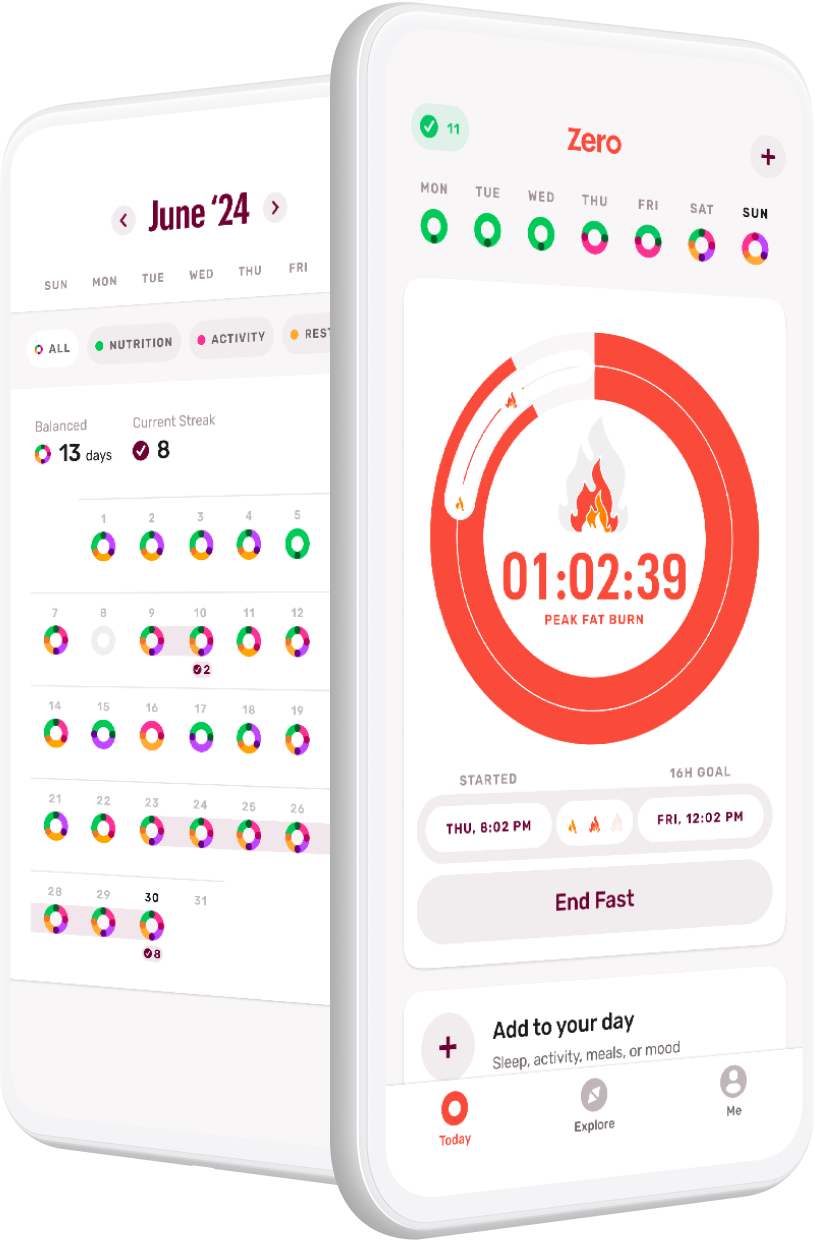Written and medically reviewed by Rich LaFountain, PhD
Intermittent fasting is a popular eating pattern that has garnered a lot of attention over the last several years. Is this meteoric rise in popularity warranted? Does intermittent fasting even work? Let’s find out!
Is Intermittent Fasting Effective?
In a word, yes. Intermittent fasting is a powerful health habit that can contribute to weight loss and improvements in metabolic health, which ultimately may reduce chronic-disease risk. What’s more, most adults can easily and safely incorporate intermittent fasting into their daily lives as an effective way to improve their decision-making around nutrition while supporting other healthy lifestyle habits.
The Pros of Intermittent Fasting
Intermittent fasting makes nutrition choices easy, because the only choice to make is when to eat. With intermittent fasting, you intentionally extend your overnight fast duration to at least 12 hours. Do this consistently enough, and over time you’ll experience a variety of health and longevity perks.
Weight Loss and Fat Burning
Intermittent fasting enables your body to metabolically switch from burning mostly glucose (sugar) for energy to burning fat as your primary fuel source. Consequently, intermittent fasting produces weight loss that is similar to more difficult traditional diets, such as counting calories; however, intermittent fasting has been shown to produce additional health benefits, such as reduced insulin resistance and improvements in blood pressure and heart-disease risk.
Extending your overnight fast to 12–18 hours of fasting will also naturally result in consuming fewer calories throughout your day and is one of the best ways to promote fat loss.
Improved Insulin Sensitivity and Blood-Sugar Control
Hormone shifts with intermittent fasting enhance insulin sensitivity and growth hormone levels. Why are these positive changes? In addition to preventing insulin resistance that can lead to diabetes, better blood-sugar control and increased growth hormones increase fat metabolism and preserve lean muscle mass. Therefore, intermittent fasting is an effective tool for those looking to achieve and maintain a healthier body composition.
Autophagy and Disease Prevention
Intermittent fasting promotes cellular health and may enhance your protection from disease through a self-cleaning process called autophagy. Fasting signals an increase in autophagy, leading to the recycling of damaged or dysfunctional cellular components. This process plays a crucial role in maintaining cellular integrity and has been linked to a reduced risk for neurodegenerative disease and certain types of cancer.
Boosting cellular renewal and repair with intermittent fasting may contribute to longevity and overall health. Research suggests fasting may play a role in promoting autophagy as a preventive measure against age-related and metabolic diseases by improving cellular health. Intermittent fasting for autophagy is a promising area of study with implications for human health and longevity.
Increased Mental Clarity and Concentration
Intermittent fasting is associated with potential cognitive benefits, including increased cognitive function and concentration. Research indicates that fasting increases the production of brain-derived neurotrophic factor (BDNF), a protein that is linked with brain function. Some data support improved mood, mental clarity, and focus with intermittent fasting.
Large fluctuations in energy and blood glucose throughout the day can hinder concentration. However, the metabolic shifts associated with fasting, including stabilized blood-sugar levels, contribute to sustained energy levels throughout the day, better cognitive function, and, consequently, concentration. Intermittent fasting could be a lifestyle approach that not only benefits physical health but may also positively impact mental acuity and concentration.
Longevity and Increased Lifespan
Intermittent fasting has garnered attention for its potential role in longevity, especially lifespan extension. One of the key mechanisms through which intermittent fasting may contribute to increased longevity is the stimulation of autophagy. By enhancing cellular repair and maintenance, intermittent fasting may help protect against the normal wear and tear associated with aging. Additionally, fasting periods trigger metabolic adaptations, such as increased production of human growth hormone (HGH), which plays a role in cellular regeneration and, of course, growth.
Intermittent fasting also has significant weight loss and fat-burning benefits, making it a popular approach for individuals seeking effective strategies to achieve and maintain healthy body weight, which can lessen disease risk and extend lifespan. By incorporating fasting periods into your routine, research shows intermittent fasting results in a spontaneous reduction in calorie intake, which naturally produces weight loss.
Reduced energy intake, coupled with metabolic adaptations during fasting, encourages the body to burn stored fat for energy, facilitating a reduction in fat mass and promoting other health and longevity benefits. In sum, accumulating evidence suggests that the cellular and metabolic health benefits linked with intermittent fasting may be a key habit for a healthier, longer life.
Simplicity and Flexibility
Intermittent fasting is superior in its simplicity and flexibility — you can choose the fasting and eating windows that suit your preferences and schedule. This makes it an accessible long-term strategy for most individuals, since it’s an eating pattern that works well with virtually any diet or lifestyle. Unlike other diet regimens, intermittent fasting does not prescribe specific foods, a meal plan, or forced calorie restriction, but instead focuses on returning to a more natural division between periods of eating healthy, nutritious food and fasting.
The success of intermittent fasting is clearly demonstrated through adherence rates, which are higher than those of most other dietary strategies. Its resurgence in popularity is not a fad; rather, it is a sustainable and practical dietary strategy for many individuals seeking healthy weight loss and longevity benefits.
The Cons of Intermittent Fasting
Today, few people routinely fast 12 or more hours, so there are some challenges associated with adopting an intermittent-fasting practice. After all, intermittent fasting is a shift away from customary or modern eating patterns. The advantages are well worth the effort, but you should know what to expect before you begin building your intermittent-fasting habit.
Initial Adjustment Period Can Be Challenging
The initial adjustment to intermittent fasting can pose a challenge for some individuals. Many people are accustomed to eating regular meals throughout the day, and the concept of intentionally incorporating periods of fasting may disrupt habits they’ve formed over years or even decades. Forming a new intermittent-fasting habit is associated with temporary bouts of hunger, irritability, or fatigue as the body adjusts to the changes in meal timing and frequency.
Overcoming these initial hurdles requires patience and perseverance, but evidence suggests that people who are successful with fasting have a greater sense of accomplishment, pride, joy, and reward. Making gradual or smaller incremental changes, such as increasing your fasting time by just 30 minutes, can help in the early stages of forming your own successful intermittent-fasting routine.
May Impact Daily Schedule and Social Situations
Adopting an intermittent-fasting practice can require shifts to your daily schedule and may impact certain social situations. While intermittent fasting is flexible, you may notice that this pattern of eating requires more intention and planning than usual. Social gatherings centered around meals may also pose a challenge if they coincide with your intended fasting window.
Remember that intermittent fasting is flexible, and you do not have to fast exactly 16 hours every single day; intermittent fasting is a health habit that can be modified to fit your needs. Over time, you will establish your own balance and find ways to seamlessly integrate intermittent fasting into your life regardless of your lifestyle or social commitments.
Requires You Prioritize High-Quality Nutrition and Meal Planning
High-quality nutrition is essential with intermittent fasting because of the condensed eating window. The smaller your eating window, the more you should focus on nutrient-dense foods at each meal and snack to ensure that you’re getting the essential macronutrients, vitamins, and minerals you need.
Prioritizing whole, unprocessed food, rich in fiber, lean proteins, and healthy fats, is vital to meet nutritional requirements and support overall health when you are intermittent fasting. As an added bonus, high-quality foods will also make you feel more satisfied and less hungry during fasts! Moreover, when you focus on enjoying high-quality meals, you’re complementing and amplifying the benefits of intermittent fasting, contributing to improved health and sustained energy levels throughout the day.
It’s Not for Everyone
Intermittent fasting is simpler and more sustainable compared with many diets that require specific rules, exclusions, and/or calorie counting. However, intermittent fasting is not suitable for everyone. Those who are still actively growing (<18 years) or who have certain medical conditions, like type-1 diabetes and chronic illnesses, should approach intermittent fasting cautiously and seek guidance from healthcare professionals.
Pregnant or breastfeeding women and anyone with a diagnosed eating disorder should not adopt an intermittent-fasting habit. While intermittent fasting has shown promise for many people, your decision to embrace this eating pattern is unique to you.
Who Should Consider Intermittent Fasting?
Intermittent fasting can be beneficial for the vast majority of adults. Generally, healthy adults with no underlying medical conditions can often successfully adopt intermittent fasting. Intermittent fasting can help with weight management and improve metabolic health, cognitive health, and autophagy, to name just a few of its myriad benefits.
Plus, intermittent fasting is flexible and can fit almost any schedule or lifestyle. Consequently, most people who adopt this habit have success achieving changes in their body weight, overall health, and longevity. Consulting with your healthcare team may be helpful if you believe you may have unique or individual challenges; we encourage you to seek medical expertise if you have questions.
Tips for Getting Started with Intermittent Fasting
Download Zero
Intermittent fasting is simple, but if you want to have lasting success, download Zero right away. Zero is a companion that will help you get the most out of your fasting practice so you can lose weight and gain health.
Zero’s Fasting Timer will help you stay on track, but it is so much more than that. The Timer adapts to your personal eating and activity habits so you can see when you are entering a state of enhanced fat burning. Zero also features a vast library of content so you can learn and search for specific topics or questions in the app. Finally, Zero’s Challenges help you test and refine different intermittent-fasting schedules.
Start Gradually
If you’re new to intermittent fasting, consider easing into it by gradually reducing your eating window. Try cutting out late-night snacks, which not only helps lengthen your fasting window, but also contributes to better sleep.
It doesn’t always make the most sense to start with a 16- or 18-hour fast goal, nor does it behoove you to shoot for alternate-day fasting right out of the gate. Instead, begin with a 12-hour fast or a 13-hour fast every day, and slowly increase the duration as your body adjusts. You’ll know it’s time to up your fast length when you effortlessly cruise through your fasts day in and day out.
Gradually work up to your desired fast duration, and pay attention to how your body responds to your new intermittent fasting schedule. For most people, starting with even just a 12:12 intermittent-fasting plan (fasting for 12 hours and eating within the other 12 hours) is a good option for shifting away from standard or customary eating patterns and towards an intermittent-fasting practice that will help you burn fat and lose weight.
Stay Hydrated and Nourished
When you’re fasting, you’re not getting any hydration from food, so it’s crucial to stay hydrated by drinking water, herbal tea, or black coffee, which can also help suppress hunger. Staying on top of your hydration and adding some electrolytes can reduce potential symptoms like lethargy or dizziness. When it’s time to break your fast, focus on nutrient-dense, minimally processed foods, including a balance of lean proteins, healthy fats, and carbohydrates, to ensure that you meet your nutritional needs within your condensed eating window.
Ready to start using Zero? Take the quiz or download the app today.
- Debunking 3 Myths Around Fasting and Thyroid Health - April 15, 2024
- Breaking Down Fast Breakers: How to Tell If Something Will Break Your Fast - March 4, 2024
- GLP-1s and Weight-Loss Medications vs. Lifestyle Interventions: What’s Right for You - February 5, 2024


